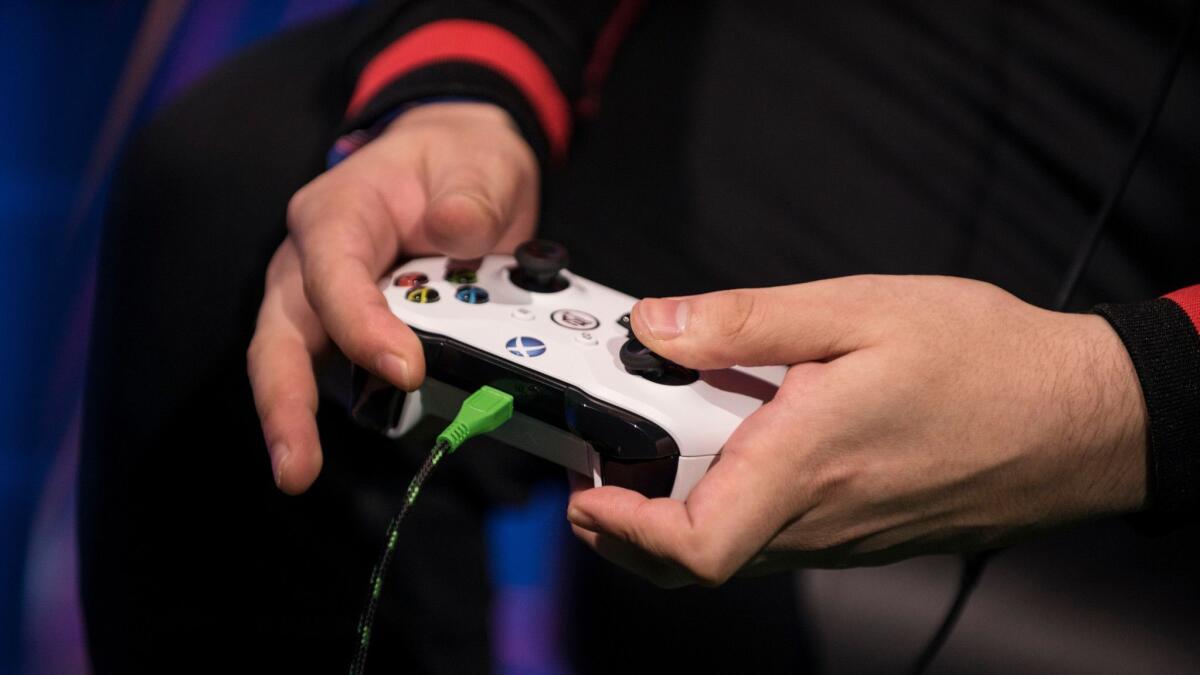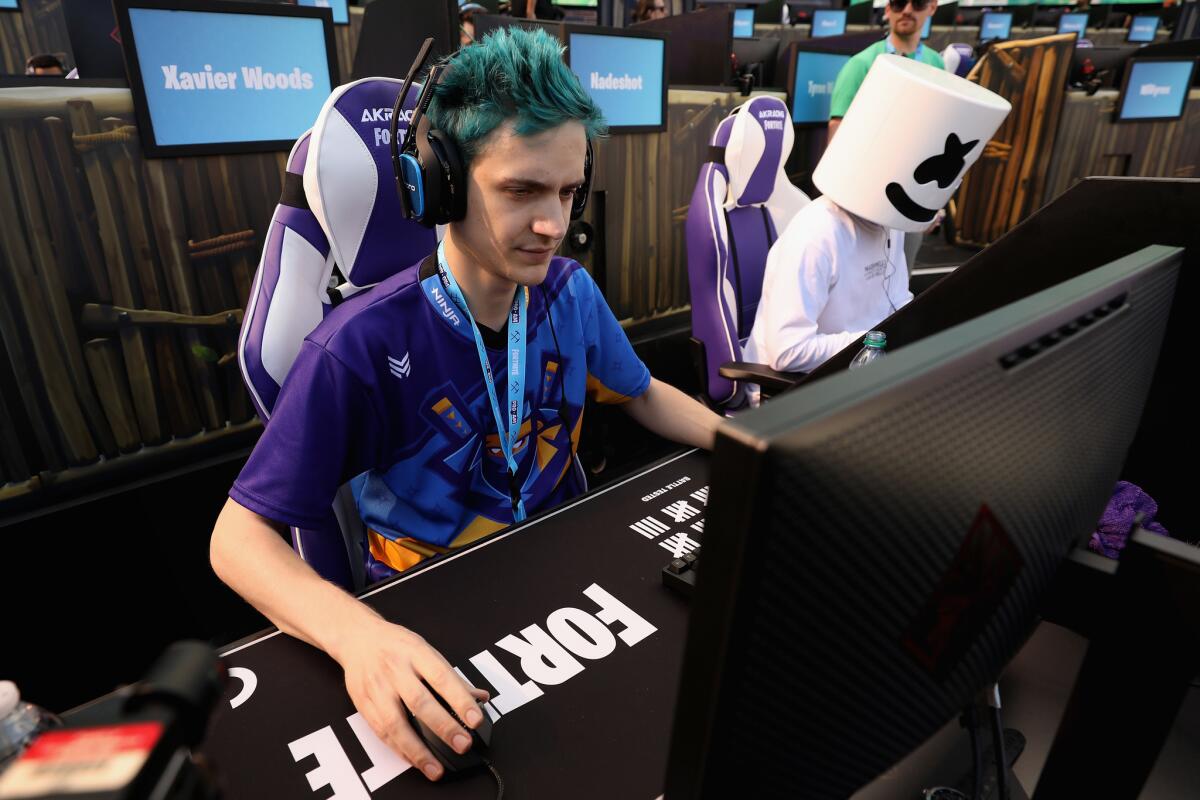Q&A: World Health Organization says video game addiction is a disease. Why American psychiatrists don’t

The World Health Organization has made it official: digital games can be addictive, and those addicted to them need help.
In the latest edition of its International Classification of Diseases, released Monday, the United Nations agency concluded that people whose jobs, educations, family or social lives have been upended by video games probably meet the criteria for a new form of addiction called “gaming disorder.”
If a person has escalated or persisted in his or her gaming behavior despite clearly negative consequences, that further seals the deal, the new guidelines say.
The behavior should be “of sufficient severity to result in significant impairment” and may be “continuous or episodic and recurrent,” the WHO’s diagnostic manual notes. While “normally evident over a period of at least 12 months,” a diagnosis may be in order sooner in cases where impairment is evident, efforts to cut back have failed and symptoms are sufficiently severe.
Sound like someone you know? Read on.
Q. Why is the World Health Organization’s decision important?
A. The WHO’s International Classification of Diseases gives medical professionals around the world a single standard for identifying a problematic medical or behavioral issue and accepting it as a disorder worthy of attention and treatment. Despite differing languages and social, cultural and medical traditions, the WHO’s 191 member nations recognize these common definitions of diseases.
In addition, the classification codes are the foundation for health insurance billing in the United States. The absence of a diagnostic code makes it difficult for a healthcare professional to treat a patient and then get paid for that treatment.
Q. Is gaming disorder diagnosed the same everywhere?
A. The WHO’s definition is pretty inclusive, sweeping in anyone who could argue their gaming habit has interfered with important daily functioning. The American Psychiatric Assn. has proposed — but not yet fully embraced — a set of diagnostic criteria that are somewhat more detailed.
The association publishes a handbook of psychiatric diseases called the Diagnostic and Statistical Manual, also known as the DSM. In 2013, the organization added internet gambling disorder to the DSM, but opted not to include internet gaming disorder — at least, not yet.
A draft diagnostic description for internet gaming disorder would require a determination that persistent gaming had caused a person to have “significant issues with functioning.” It also calls for five of the following symptoms to be present:
• A preoccupation or obsession with internet games.
• Withdrawal symptoms when not playing games.
• A tolerance for gaming, so that a person needs to spend more time playing to be satisfied.
• At least one failed attempt to stop or cut back on playing games.
• A loss of interest in other life activities.
• Overuse of digital games despite realizing the impairment they have caused.
• Lying to others about game usage.
• Using gaming to escape or relieve anxiety or guilt.
• Relationships have been lost or risked because of gaming.
Q. Who is at risk for having a gaming disorder, and how widespread is it?
A. In 2013, it appeared that internet gaming disorder was most common in male adolescents between the ages of 12 and 20, and that the affliction was more prevalent in Asian countries than in North America and Europe. Experts estimated that close to 10% of kids in China and 1% to 2% of kids and teens in the United States were affected. That may explain why WHO recognized it first, while the APA demurred.
A more recent study underscores that gaming addiction is probably a worldwide phenomenon, albeit an uncommon one. The analysis of close to 19,000 internet users from the U.S., Canada, the United Kingdom and Germany found that among those who played games, just under 1 in 3 reported at least one symptom of internet gaming disorder. But very few — between 0.3% and 1.0% of the general population — might qualify for a diagnosis of internet gaming disorder, according to the 2017 report in the American Journal of Psychiatry.
“Video game addiction might be a real thing,” psychologists Patrick M. Markey of Villanova University and Christopher J. Ferguson of Stetson University wrote in a commentary accompanying that study. “But it is not the epidemic that some have made it out to be.”
Q. How is gaming disorder treated?
A. This was one of the bits of unfinished business that stayed the American Psychiatric Assn.’s hand in 2013.
“There really hasn’t been a good study of what kind of treatment works,” said Dr. Andrew Saxon, professor of psychiatry and behavioral science at University of Washington’s School of Medicine in Seattle and chair of the APA’s Council on Addiction Psychiatry. “We’re in the realm of semi-experts giving recommendations,” he said.
Cognitive behavioral therapy, which focuses on identifying the problem and devising strategies and paths to resistance, works well, said Dr. Petros Levounis, an addiction specialist who chairs the department of psychiatry at Rutgers’ New Jersey Medical School.
“Gaming disorder does seem to respond to psychotherapy, and counseling can be quite effective,” he said.
As in other addictions, the biggest challenge comes up front, “where people may see nothing wrong with it,” Levounis added. “There’s a lack of insight into the consequences of the behavior that’s difficult to address.”
Q. Are certain people more at risk for gaming disorder?
Yes, people who have other psychiatric disorders.
“Rates of depression, anxiety, ADHD are very high among this population,” Saxon said. “If you can treat those, that might make it easier to treat the internet gaming disorder.”
Q. People love to play games, just like they love watching TV or working out. How is that an addiction?
A. Psychiatrists have been debating this question since they first drew connections between addictions to substances like alcohol or drugs and problems with excessive engagement in pleasurable (and often unavoidable) behaviors like eating, shopping and sex.
Q. What are the arguments in favor?
Multiple studies have found that substance addictions and behavioral addictions share much of the same brain circuitry. Imaging studies have found that the urge to play video games activates the same brain regions that light up when compulsive gamblers or those addicted to illicit drugs ponder the prospect of gambling or drug use.
Some of the neural consequences may be the same too: A 2012 study suggests that the effects of excessive online game-playing on working memory may be similar to those observed in patients addicted to drugs or alcohol. Consequently, some researchers assume that problematic gaming might share some of the same neurobiological mechanisms as pathological gambling and substance dependence.
Q. What are the arguments against?
There’s a key practical distinction, adherents to this side say.
Dependence on alcohol or drugs — and for that matter, gambling — can be treated with abstention or avoidance. By contrast, eating is necessary, sex is key to a healthy romantic relationship, and shopping is virtually impossible to avoid.
In the 21st century, spending time online is pretty much a fact of life as well. That makes abstention or avoidance all but impossible, Saxon said.
“Do you tell people you can’t go online or have devices? Because you can’t go online without getting that stimulus they’re seeking,” he said. “I’m not sure how we go about that. A lot more work would have to be done to look at the treatment.”
Q. How do we know that digital gaming isn’t just a fad?
A. With games like Fortnite, League of Legends and Pokeman Go, digital gaming has taken the world by storm relatively recently. But it could lose its allure — and vast audience — just as quickly. Is this any way to diagnose a true psychiatric disorder?

Opinions differ on this one as well. Levounis noted that over the years, many diseases have bubbled up and either died down on their own or been swatted into obscurity by vigilance and treatments. But they still needed to be identified, characterized and treated, he argued. Despite having been eradicated by vaccines, smallpox was once a very real disease, he said.
Saxon isn’t so sure.
“Substance use disorders have been with humans through recorded history,” he said. “But having an electronic device that lets you connect to the rest of the world has only been widespread for 10 to 20 years. For all we know, some phenomenon will come on and five years from now, people will be doing other very disruptive things with their lives. That’s one reason why the framers of the DSM 5 were a little cautious.”
MORE IN SCIENCE
Foods that are both fatty and sweet can hijack the part of the brain that regulates food consumption
Ties between researchers and alcohol producers prompt NIH to shut down study of moderate drinking
All around the world, humans are forcing other mammals to be more active at night



